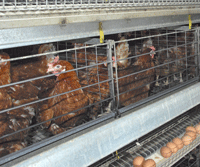Conventional cages for egg laying hens to go in 2012

An EU-wide ban on the use of conventional battery cages for egg laying hens will be applied from 1 January 2012, the EU Commission confirmed this week.
The ruling follows publication of a new commission report which claims there are clear advantages to be had by using so-called “enriched” cages, which provide more space and include a nest, litter, perch and clawing boards. This, it says, will reduce the risk of disease, bone breakage and mortality.
“The report today shows that there is scientific and economic support for the ban on conventional battery cages,” said EU health commissioner Markos Kyprianou. “We are maintaining the deadline of 2012 for banning conventional battery cages, as there is no reason to postpone it.”
The EU egg industry had sought to delay the banning of conventional cages, arguing that it would put up the cost of EU egg production and play into the hands of cheap imports from countries with lower standards.
But the EU Commission denies this. Its report says the cost of switching to enriched cages should only amount to 1 euro cent per egg (0.75p).

“However, the higher animal welfare standards can serve as a valuable selling point for EU producers,” it adds, pointing to a Eurobarometer survey that shows EU consumers are prepared to pay more for welfare-friendly eggs.
To try to secure this advantage, the commission report recommends running a number of campaigns between now and 2012, to promote public awareness of the way hens are reared.
But NFU poultry board chairman Charles Bourns remains sceptical. “It is estimated that the cost of converting to enriched cages and alternative systems will come to about £400m in the UK and £4bn for the whole of the EU.”
With feed cost pressure, there was no profit to pay for it and borrowing money from the banks was almost a non-starter, as was trying to get planning permission for new buildings.
The fact that sales of cage-produced eggs had increased by 11% last year due to price promotions, while organic egg sales had fallen showed that consumers wanted cheap eggs more than welfare-friendly ones, he added.
Mr Bourns also feared that, despite the commission’s best intentions, by 2012 many member states would be granted extensions to the use of conventional cages.
“Whatever the political pressure, that is the reality,” he said. “I believe that post-2012 there will still be 150m-plus hens in conventional cages, especially in new member states. But asking DEFRA to try for an extension is a waste of time.”
